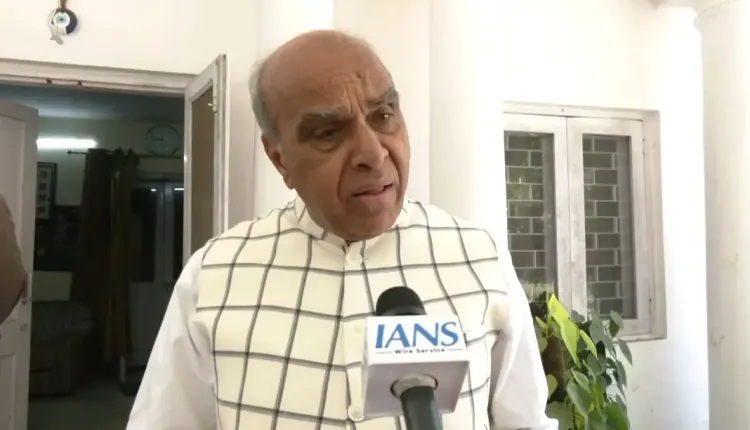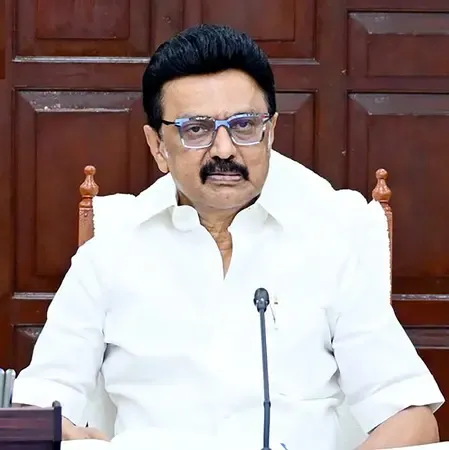JPC Chief Urges Muslim Leaders to Avoid Politicizing Eid Amid Waqf Bill Controversy

Synopsis
Key Takeaways
- Muslims protested against the Waqf Amendment Bill by wearing black bands.
- Jagdambika Pal criticized the politicization of Eid.
- AIMPLB urged peaceful protests during Jumma prayers.
- Pal asserted the importance of presenting the Bill in Parliament first.
- Concerns raised over the politicizing of Ramadan and Ramzan.
New Delhi, March 31 (NationPress) On the occasion of Eid, some Muslims were observed wearing black armbands while participating in prayers at mosques in cities such as Delhi, Sambhal, and Bhopal. This act, interpreted as a peaceful protest against the Waqf (Amendment) Bill 2024, received strong condemnation from Jagdambika Pal, Chairman of the Joint Parliamentary Committee (JPC). Pal questioned the political intentions behind this gesture, underlining that Eid should serve as a time for spiritual reflection, rather than political expressions.
The All India Muslim Personal Law Board (AIMPLB) had previously called on Muslims to don black armbands during ‘Alvida Jumma’ prayers as a peaceful protest against the proposed Waqf Amendment Bill.
In an interview with IANS, Jagdambika Pal stated, “It is Eid, and while people engaged in namaz, some also protested against the Bill by wearing black bands. I extend my best wishes to everyone on this significant occasion. Eid symbolizes brotherhood, forgiveness, and resolving disputes. Why turn this sacred day into a political event? The amendment Bill has yet to be introduced in Parliament.”
He further criticized the efforts to create rifts on such a crucial religious day: “During Ramadan, a month devoted to worshiping Allah, why was there a nationwide appeal to wear black bands? Today was meant for prayer, not political protests. The government must first present the Bill in Parliament. If it serves the interests of the underprivileged and weaker Muslims, it should be welcomed. However, what we are witnessing is merely politics.”
Pal also denounced the politicization of Ramzan, asserting, “The entire month of Ramzan has been transformed into a political battleground. Opposition leaders such as Asaduddin Owaisi have been making statements, targeting political figures like Nitish Kumar and Chandrababu Naidu. Even Kiren Rijiju clarified that the amendment will not impact any mosque. Nevertheless, there’s an effort to mislead the public. Are they attempting to create instability or stir discord? Numerous Muslim organizations have expressed support for the Waqf Amendment Bill.”
“We have submitted our report. Now, it is the government's duty to advance the Bill as planned in collaboration with the Joint Committee,” Pal added.
Pal also responded to West Bengal Chief Minister Mamata Banerjee's recent comments, urging individuals not to succumb to provocations that could incite communal riots. Banerjee criticized the BJP, questioning whether they would alter the Constitution if they faced issues with minorities.
Pal retorted sharply: “She neglects to recognize the festivals of Sanatan Dharma and even attempted to obstruct the events of the BJP state president, resulting in police lathi charges. Her actions appear to be aimed at escalating tensions. The police in West Bengal are being politicized under the influence of the Trinamool, which threatens to incite riots.”
Pal also reacted to Congress leader Sonia Gandhi's strong denunciation of the National Education Policy (NEP) 2020. Gandhi accused the BJP-led government of using the NEP to centralize power, commercialize education, and communalize the curriculum.
Pal countered, “Had they thoroughly examined the NEP, they would understand that it promotes learning in mother tongues alongside regional languages. The policy advocates for multilingual education, providing students with the flexibility to select languages such as Hindi, Tamil, Kannada, or English. The emergence of new IITs, IIMs, and educational hubs under this policy has earned Indian students global recognition, including in Silicon Valley.”
Meanwhile, in an opinion piece published in The Hindu newspaper, Gandhi stated, "The Union Government’s track record over the last decade has convincingly demonstrated that in education, it is concerned only with the successful implementation of three core agenda items — the centralization of power with the Union Government; the commercialization and outsourcing of investments in education to the private sector, and the communalization of textbooks, curriculum, and institutions."









